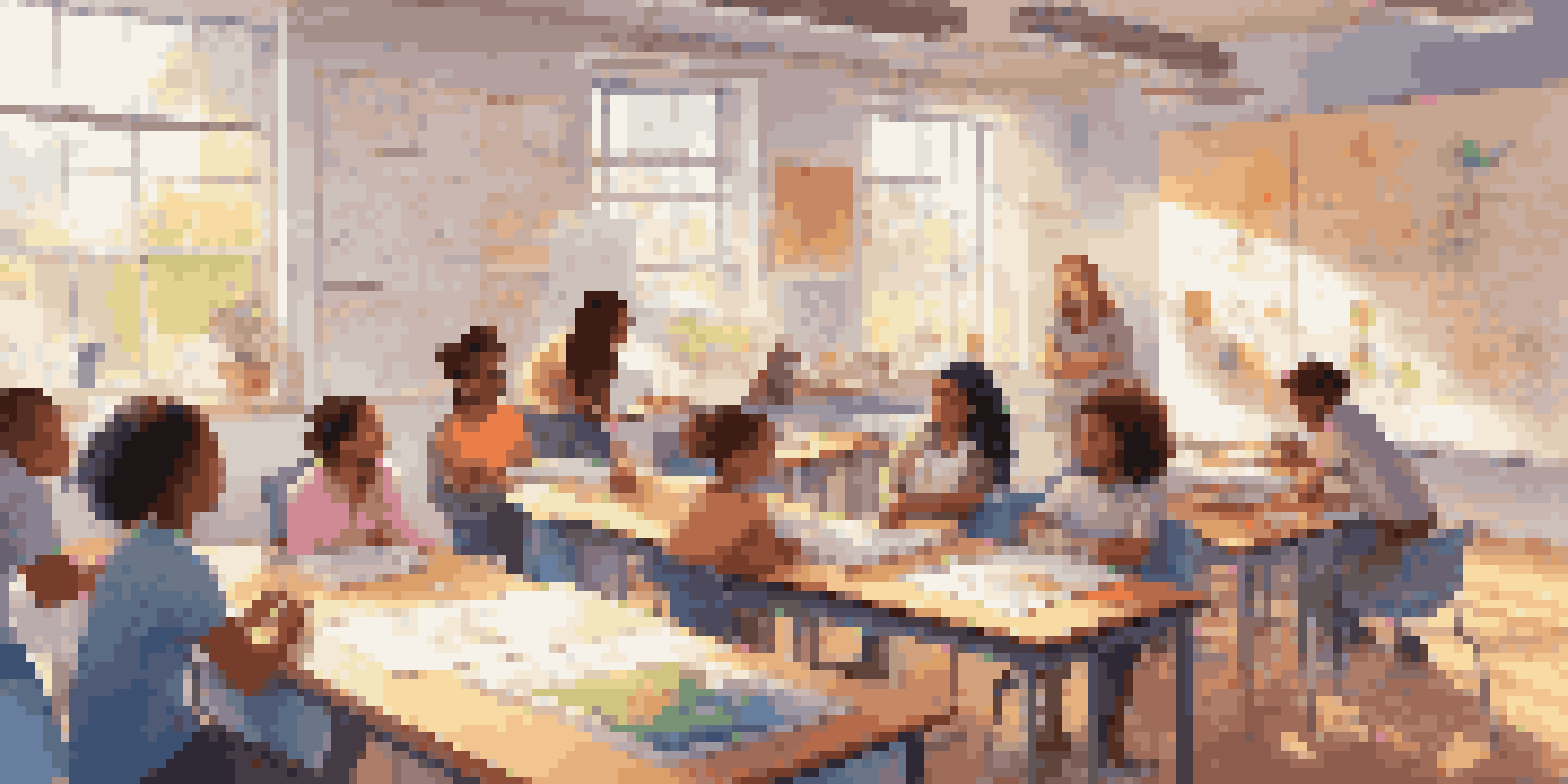Building Resilient Learners Through Project-Based Learning

Understanding Project-Based Learning and Its Benefits
Project-Based Learning (PBL) is an engaging educational approach where students learn by actively exploring real-world problems. This hands-on method encourages learners to take ownership of their education, making lessons more relevant and impactful. Instead of passive listening, students engage in projects that require critical thinking and collaboration, which is essential for developing resilience.
Tell me and I forget. Teach me and I remember. Involve me and I learn.
Through PBL, students are not just recipients of information; they are creators, problem solvers, and innovators. This shift from traditional learning to a more dynamic form fosters a sense of agency in students, empowering them to tackle challenges head-on. By working on projects, they learn to navigate obstacles, adapt their strategies, and persevere until they reach their goals.
Moreover, PBL promotes deeper understanding and retention of knowledge. When students connect what they learn to real-life situations, they are more likely to remember it and apply it in the future. This deeper connection not only enhances their learning experience but also builds resilience as they learn to face and overcome difficulties.
Fostering a Growth Mindset in Learners
A key aspect of resilience is having a growth mindset—the belief that abilities and intelligence can be developed through dedication and hard work. PBL naturally cultivates this mindset by encouraging students to take risks and embrace mistakes as learning opportunities. When learners engage in projects, they often encounter challenges that require them to adapt and rethink their approaches.

For example, if a student’s initial idea for a project doesn’t work out, instead of giving up, they learn to analyze what went wrong and how to improve. This process of reflection and iteration instills a sense of perseverance, showing them that failure is just a stepping stone to success. Over time, this builds their confidence and resilience in facing future challenges.
PBL Fosters Student Ownership
Project-Based Learning encourages students to take charge of their education by actively engaging in real-world projects.
Teachers play a crucial role in nurturing this growth mindset. By providing constructive feedback and celebrating effort rather than just results, educators can help students develop a positive attitude towards challenges. This supportive environment encourages learners to embrace difficulties as part of their educational journey.
Collaboration: The Heart of Project-Based Learning
Collaboration is a cornerstone of PBL, teaching students how to work effectively with others. When learners collaborate on projects, they must communicate, share ideas, and resolve conflicts—all vital skills for building resilience. This teamwork not only enhances their social skills but also prepares them for the collaborative nature of the modern workforce.
The only way to do great work is to love what you do.
In a collaborative environment, students learn to appreciate diverse perspectives and strengths. For instance, one student might excel in research while another shines in presentation skills. By working together, they can leverage each other's strengths, which not only leads to better project outcomes but also reinforces the importance of supporting one another through challenges.
Additionally, collaboration fosters empathy and understanding, as students learn to navigate different opinions and approaches. This experience builds emotional resilience, allowing them to handle interpersonal challenges with maturity. As they learn to depend on each other, they also realize the value of community in overcoming obstacles.
Real-World Connections Enhance Learning
One of the most powerful aspects of PBL is its emphasis on real-world connections. When students work on projects that address actual community issues or global challenges, they see the relevance of their education. This connection not only motivates them to engage more deeply but also helps them understand the impact of their work.
For example, a project focused on environmental sustainability can inspire students to think critically about their role in the world. By working on solutions, they not only learn valuable skills but also develop a sense of responsibility and agency. This awareness fosters resilience, as they understand that their actions can lead to meaningful change.
Collaboration Builds Resilience
Working together on projects enhances students' teamwork skills and emotional resilience as they navigate challenges with peers.
Moreover, tackling real-world problems often requires students to face uncertainty and complexity, which are key components of resilience. They learn to navigate ambiguity and develop strategies to find solutions, preparing them for the unpredictable nature of life and work beyond the classroom.
Empowering Student Voice and Choice
In PBL, student voice and choice are paramount. Allowing learners to select their projects or topics fosters ownership and investment in their learning. This element of choice encourages them to pursue their interests and passions, leading to a more engaged and motivated learner.
When students feel that their opinions matter and are given the freedom to express themselves, they are more likely to take risks and overcome challenges. For instance, if a student is passionate about technology, they may choose to create a project that integrates coding, which not only enhances their skills but also builds resilience as they tackle new concepts.
Furthermore, empowering students in this way encourages them to advocate for themselves and their ideas. This advocacy is a crucial aspect of resilience, as it teaches them to stand up for their beliefs and navigate opposition. By fostering a sense of agency, PBL helps students become confident, resilient individuals.
Reflection: A Key Component of Learning
Reflection is an essential part of the learning process in PBL. It gives students the opportunity to pause and consider their experiences, successes, and areas for improvement. This practice not only deepens their understanding but also helps them recognize their growth over time, which is vital for building resilience.
For instance, after completing a project, students might engage in discussions or write reflections about what worked, what didn’t, and how they can improve in the future. This process of self-assessment encourages them to take responsibility for their learning and understand that setbacks are part of the journey.
Reflection Enhances Learning Growth
Regular reflection allows students to assess their experiences and recognize their growth, which is essential for developing resilience.
Moreover, regular reflection helps students develop critical thinking skills as they analyze their work and decision-making processes. This habit of introspection fosters a growth mindset and resilience, equipping them with the tools to approach future challenges with confidence and determination.
The Role of Educators in Building Resilient Learners
Educators play a pivotal role in implementing PBL effectively and fostering resilience in students. Their guidance and support are essential in creating an environment where learners feel safe to take risks and express their thoughts. By modeling resilience themselves, teachers can inspire students to adopt similar attitudes towards challenges.
Furthermore, educators must provide the necessary resources and scaffolding to help students navigate their projects. This support might include teaching organizational skills, time management, or providing feedback throughout the process. By equipping students with these tools, teachers empower them to tackle projects confidently and develop resilience.

Lastly, celebrating student efforts and achievements—big and small—is crucial. Recognizing resilience in action reinforces the idea that persistence leads to success. When students see their hard work acknowledged, it boosts their confidence and encourages them to continue facing challenges head-on.